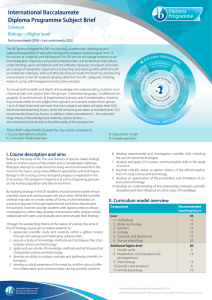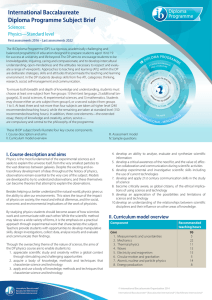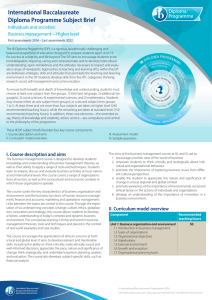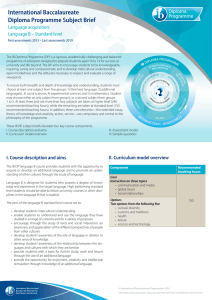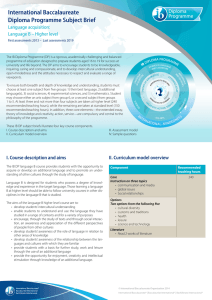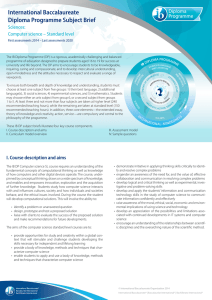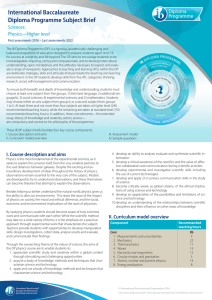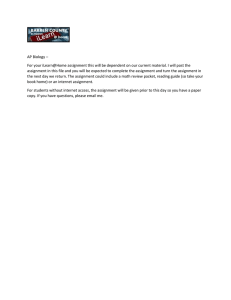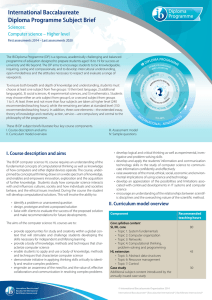International Baccalaureate Diploma Programme Subject Brief Sciences: Biology—Standard level
advertisement
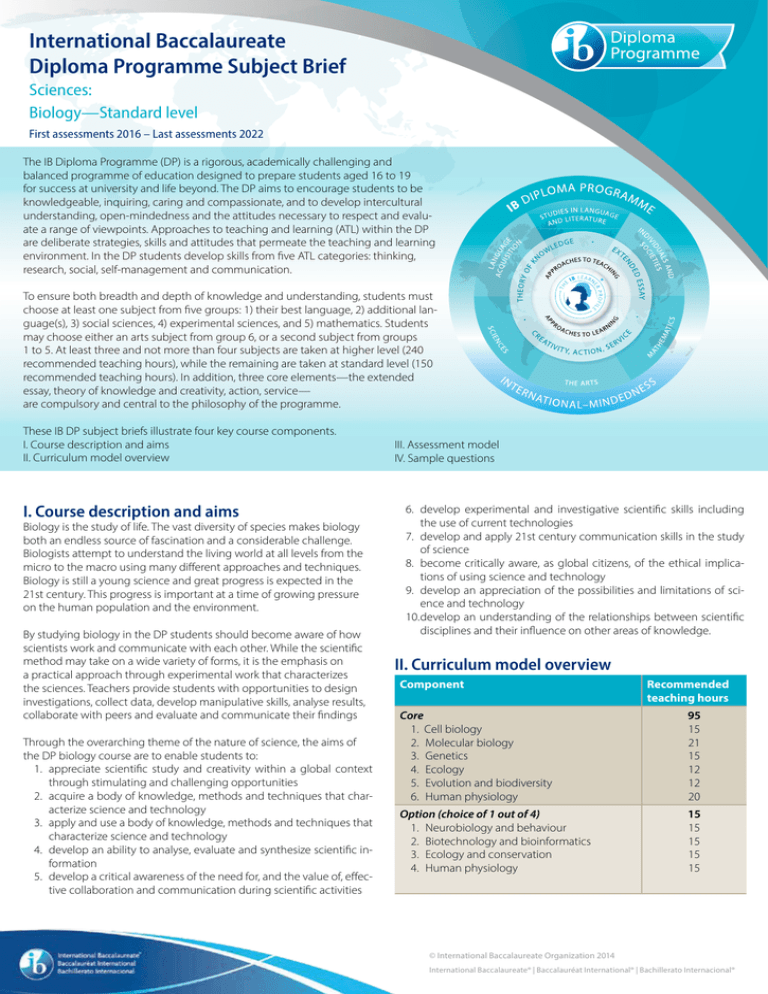
International Baccalaureate Diploma Programme Subject Brief Sciences: Biology—Standard level First assessments 2016 – Last assessments 2022 The IB Diploma Programme (DP) is a rigorous, academically challenging and balanced programme of education designed to prepare students aged 16 to 19 for success at university and life beyond. The DP aims to encourage students to be knowledgeable, inquiring, caring and compassionate, and to develop intercultural understanding, open-mindedness and the attitudes necessary to respect and evaluate a range of viewpoints. Approaches to teaching and learning (ATL) within the DP are deliberate strategies, skills and attitudes that permeate the teaching and learning environment. In the DP students develop skills from five ATL categories: thinking, research, social, self-management and communication. To ensure both breadth and depth of knowledge and understanding, students must choose at least one subject from five groups: 1) their best language, 2) additional language(s), 3) social sciences, 4) experimental sciences, and 5) mathematics. Students may choose either an arts subject from group 6, or a second subject from groups 1 to 5. At least three and not more than four subjects are taken at higher level (240 recommended teaching hours), while the remaining are taken at standard level (150 recommended teaching hours). In addition, three core elements—the extended essay, theory of knowledge and creativity, action, service— are compulsory and central to the philosophy of the programme. These IB DP subject briefs illustrate four key course components. I. Course description and aims II. Curriculum model overview I. Course description and aims Biology is the study of life. The vast diversity of species makes biology both an endless source of fascination and a considerable challenge. Biologists attempt to understand the living world at all levels from the micro to the macro using many different approaches and techniques. Biology is still a young science and great progress is expected in the 21st century. This progress is important at a time of growing pressure on the human population and the environment. By studying biology in the DP students should become aware of how scientists work and communicate with each other. While the scientific method may take on a wide variety of forms, it is the emphasis on a practical approach through experimental work that characterizes the sciences. Teachers provide students with opportunities to design investigations, collect data, develop manipulative skills, analyse results, collaborate with peers and evaluate and communicate their findings Through the overarching theme of the nature of science, the aims of the DP biology course are to enable students to: 1. appreciate scientific study and creativity within a global context through stimulating and challenging opportunities 2. acquire a body of knowledge, methods and techniques that characterize science and technology 3. apply and use a body of knowledge, methods and techniques that characterize science and technology 4. develop an ability to analyse, evaluate and synthesize scientific information 5. develop a critical awareness of the need for, and the value of, effective collaboration and communication during scientific activities III. Assessment model IV. Sample questions 6. develop experimental and investigative scientific skills including the use of current technologies 7. develop and apply 21st century communication skills in the study of science 8. become critically aware, as global citizens, of the ethical implications of using science and technology 9. develop an appreciation of the possibilities and limitations of science and technology 10.develop an understanding of the relationships between scientific disciplines and their influence on other areas of knowledge. II. Curriculum model overview Component Recommended teaching hours Core 1. Cell biology 2. Molecular biology 3.Genetics 4.Ecology 5. Evolution and biodiversity 6. Human physiology 95 15 21 15 12 12 20 Option (choice of 1 out of 4) 1. Neurobiology and behaviour 2. Biotechnology and bioinformatics 3. Ecology and conservation 4. Human physiology 15 15 15 15 15 © International Baccalaureate Organization 2014 International Baccalaureate® | Baccalauréat International® | Bachillerato Internacional® Practical scheme of work Prescribed and other practical activities Individual investigation Group 4 project 40 20 10 10 Assessment at a glance Type of assessment The group 4 project External The group 4 project is a collaborative activity where students from different group 4 subjects, within or between schools, work together. It allows for concepts and perceptions from across disciplines to be shared while appreciating the environmental, social and ethical implications of science and technology. It can be practically or theoretically based and aims to develop an understanding of the relationships between scientific disciplines and their influence on other areas of knowledge. The emphasis is on interdisciplinary cooperation and the scientific processes. Time (hours) Weighting of final grade (%) 3 80 Paper 1 30 multiple-choice questions 0.75 20 Paper 2 Data-based, short answer and extended response questions 1.25 40 Paper 3 Data-based, short answer and extended response questions 1 20 10 20 10 20 Internal III. Assessment model It is the intention of this course that students are able to fufill the following assessment objectives: 1. Demonstrate knowledge and understanding of: • facts, concepts, and terminology • methodologies and techniques • communicating scientific information. 2.Apply: • facts, concepts, and terminology • methodologies and techniques • methods of communicating scientific information. 3. Formulate, analyse and evaluate: • hypotheses, research questions and predictions • methodologies and techniques • primary and secondary data • scientific explanations. 4. Demonstrate the appropriate research, experimental, and personal skills necessary to carry out insightful and ethical investigations. Format of assessment Individual investigation Investigation and write-up of 6 to 12 pages IV. Sample questions • Cyclins were discovered by Timothy R. Hunt in 1982 while studying sea urchins. What is a function of cyclins? (Paper 1) • Antibiotics can be used to treat bacterial infections in human tissues because of differences in cell structure between prokaryotes and eukaryotes. o Distinguish between the structure of prokaryotes and eukaryotes. o Evaluate the drug tests that Florey and Chain carried out on penicillin. o Explain the reasons for the ineffectiveness of antibiotics in the treatment of viral diseases. (Paper 2) • The company BASF produces a genetically modified potato called Amflora. Outline the purpose of modifying the potato. (Paper 3) About the IB: For over 40 years the IB has built a reputation for high-quality, challenging programmes of education that develop internationally minded young people who are well prepared for the challenges of life in the 21st century and able to contribute to creating a better, more peaceful world. For further information on the IB Diploma Programme, and a complete list of DP subject briefs, visit: http://www.ibo.org/diploma/. Complete subject guides can be accessed through the IB online curriculum centre (OCC) or purchased through the IB store: http://store.ibo.org. For more on how the DP prepares students for success at university, visit: www.ibo.org/recognition or email: recognition@ibo.org.
